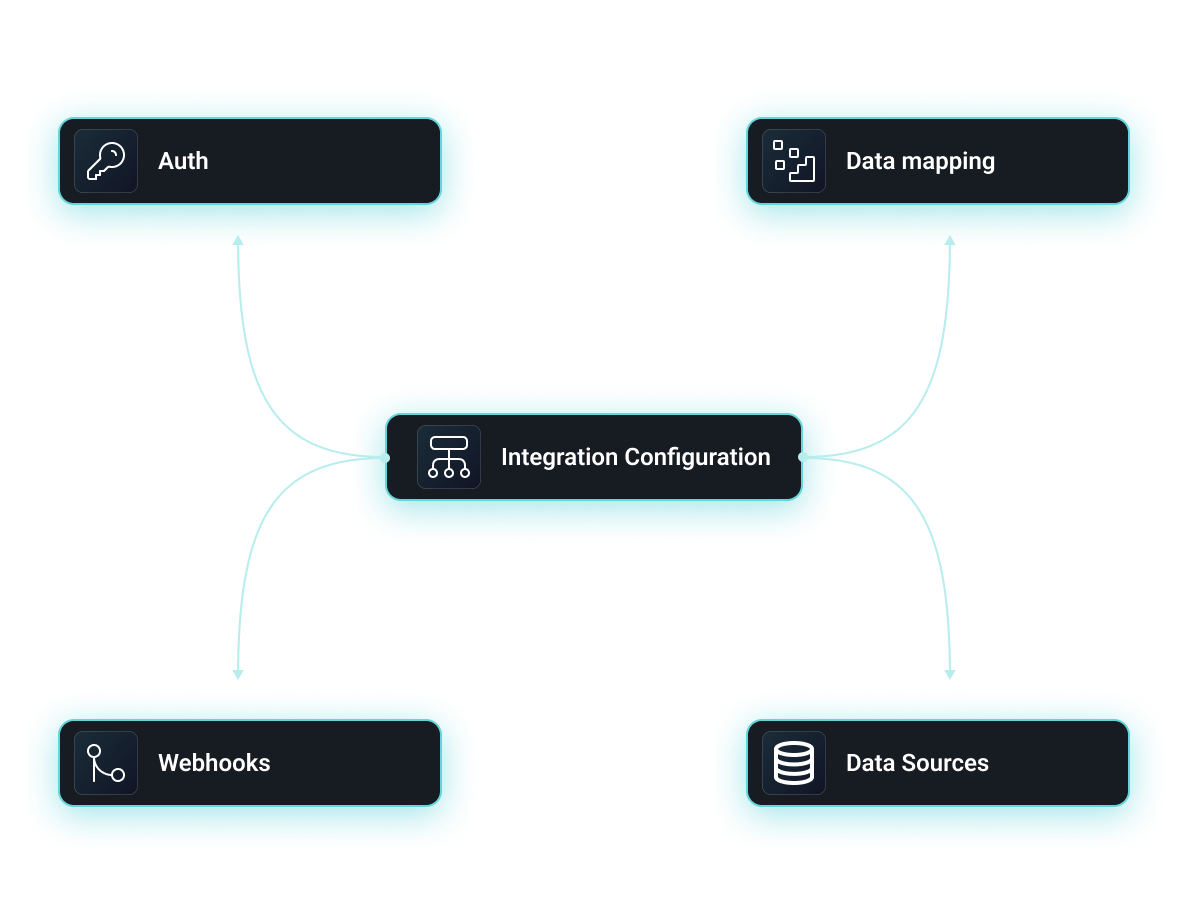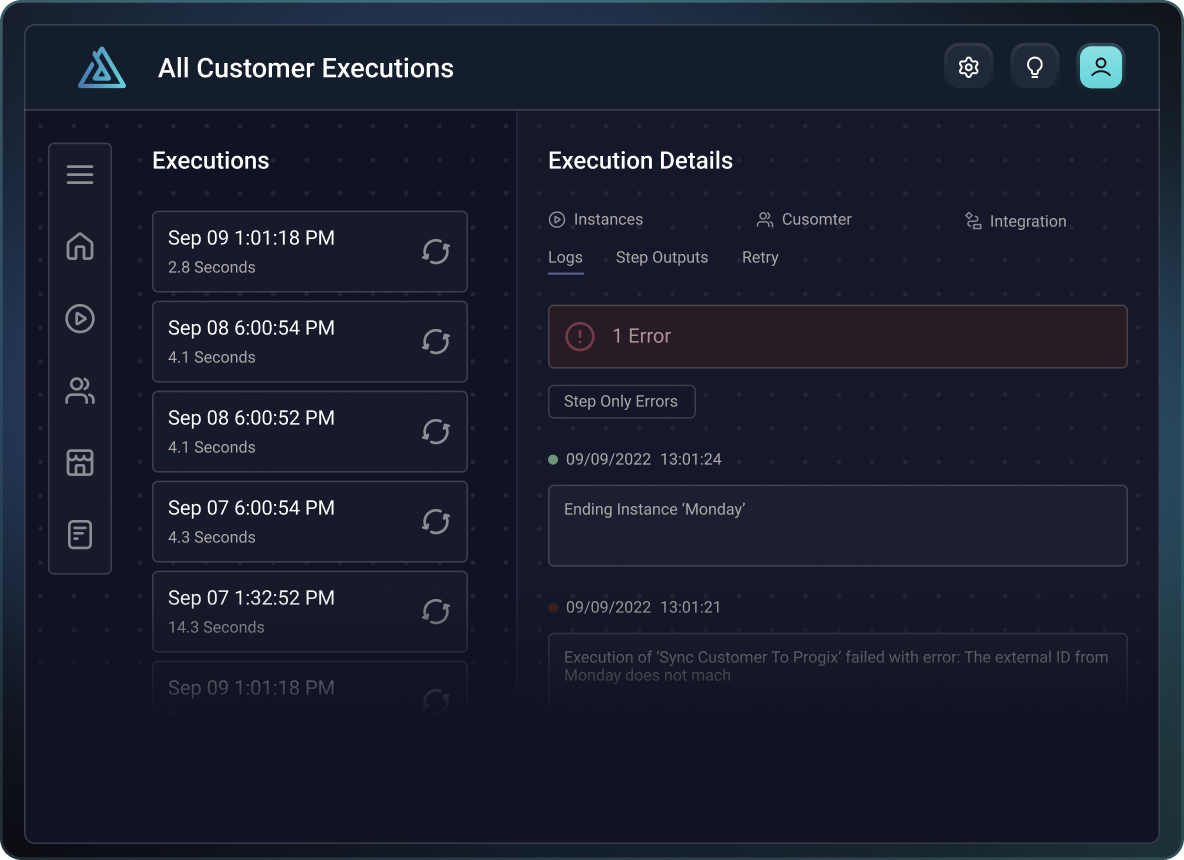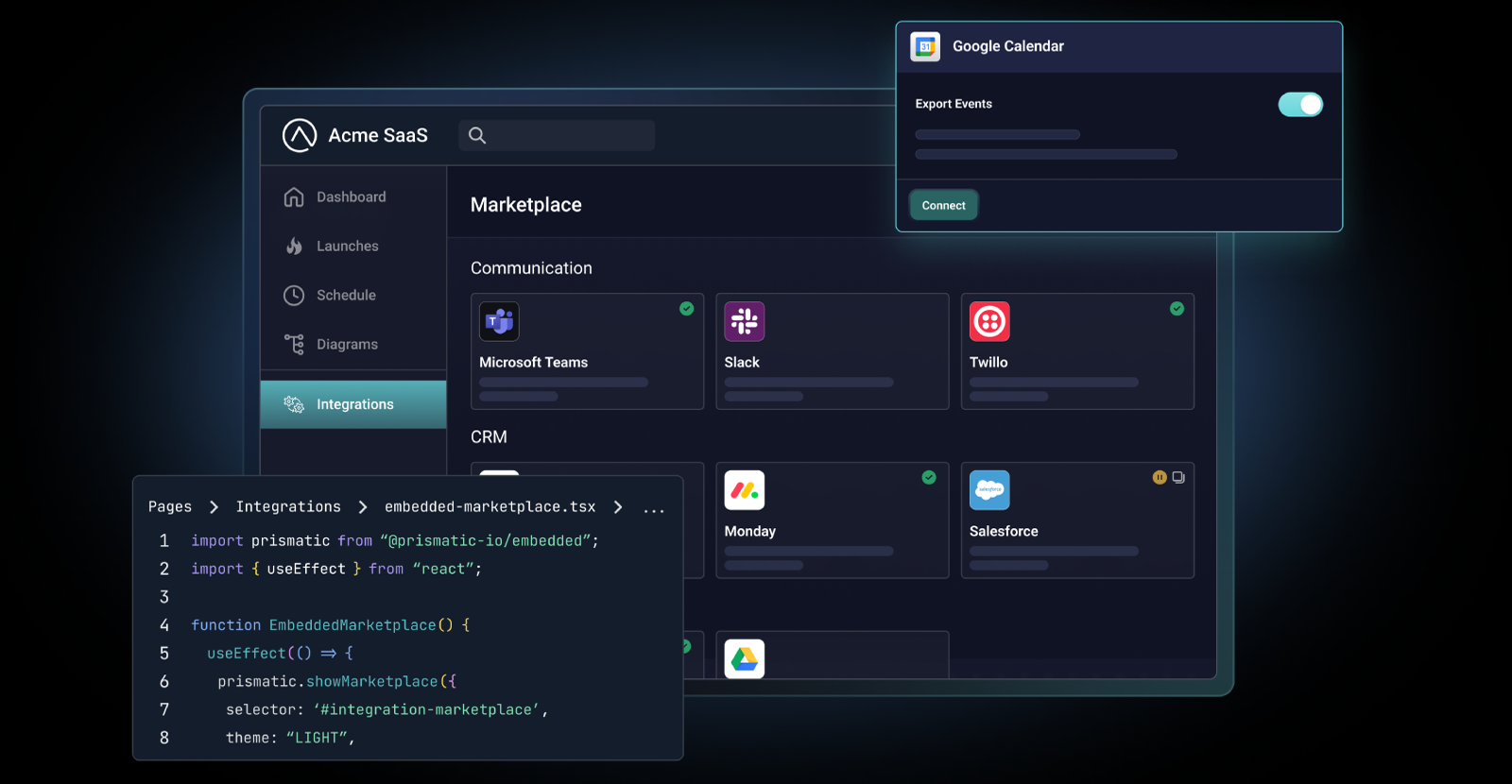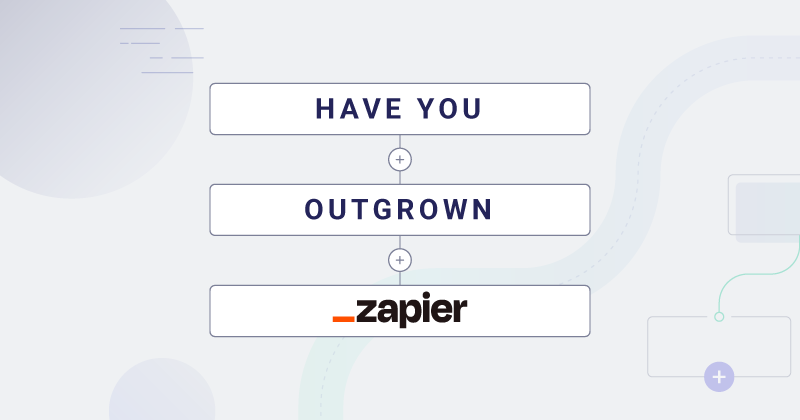What are the differences between Prismatic and Appmixer?
Appmixer is an integration platform best suited for smaller SaaS companies who will only ever need integrations that can be assembled from the platform's available connectors. Appmixer provides a no-code builder for non-devs, but doesn’t provide a means for devs to write integrations completely in code. In addition, while Appmixer provides a marketplace and embedded workflow builder, both of these must be set up and configured via an SDK.
Appmixer | |||
|---|---|---|---|
| Low-code integration designer | |||
| Pre-built connector library and custom component SDK | |||
| Embedded integration marketplace | |||
| Flexible embedding options including custom UI via API | |||
| Embedded workflow builder for your customers | |||
| Comprehensive deployment and support tooling | |||
| Enables sophisticated customer-specific configurations | |||
| Granular versioning control of integrations and their connectors | |||
- Low-code integration designer
- Pre-built connector library and custom component SDK
- Embedded integration marketplace
- Flexible embedding options including custom UI via API
- Embedded workflow builder for your customers
- Comprehensive deployment and support tooling
- Enables sophisticated customer-specific configurations
- Granular versioning control of integrations and their connectors
- Appmixer
- Low-code integration designer
- Pre-built connector library and custom component SDK
- Embedded integration marketplace
- Flexible embedding options including custom UI via API
- Embedded workflow builder for your customers
- Comprehensive deployment and support tooling
- Enables sophisticated customer-specific configurations
- Granular versioning control of integrations and their connectors

Prismatic beautifully supports the model we wanted: technical support staff configure new instances of known integrations; software engineers get involved when there's something new; support staff can monitor what's happening day-to-day. Meanwhile, we can focus engineering cycles on adding value for our customers.


With Prismatic, we're able to deliver integrations in far less time while streamlining our engineering effort. Prismatic has given us the ability to more widely build integrations across our teams. It has also allowed our customer-facing teams to handle customer-specific deployment.


Prismatic has been a game-changer for our team. The platform's intuitive low-code builder, marketplace and robust monitoring capabilities allow us to deliver complex integrations faster and more reliably than ever before. Whether quickly wiring up an integration using pre-built components or developing custom logic, Prismatic gives us the flexibility we need.


We probably save 95% of engineering time; we've deployed far more integrations than we would have without Prismatic. Everyone gets it; everyone understands that we can integrate wherever we need to, and that's quite a powerful thing.


The speed to market, the development costs, the ease of usability, the variety of integrations, the ability to customize it, and then also make a seamless marketplace. It's the whole package. Prismatic has changed the game, certainly 100% for us.


We've been able to see a roughly 50% increase in new customer acquisition simply by that factor of reducing time on our maintenance. My development team can now focus on new integrations and new automations.


After evaluating numerous embedded iPaaS vendors, Prismatic emerged as the clear leader for scaling customer integrations. Their comprehensive toolset not only enables access to diverse data sources but empowers our customers to build, deploy, and manage their own integrations with confidence.


Prismatic has enabled FMX to be efficient, consistent, and reliable in our integrations with third party systems. Prismatic has quickly become the clear choice for all facets of our integration strategy, including the migration of current integrations from previous solutions. We are pleased to mention our partnership with Prismatic when discussing system integration with prospects, customers, and other solution providers.


Prismatic beautifully supports the model we wanted: technical support staff configure new instances of known integrations; software engineers get involved when there's something new; support staff can monitor what's happening day-to-day. Meanwhile, we can focus engineering cycles on adding value for our customers.


With Prismatic, we're able to deliver integrations in far less time while streamlining our engineering effort. Prismatic has given us the ability to more widely build integrations across our teams. It has also allowed our customer-facing teams to handle customer-specific deployment.


Prismatic has been a game-changer for our team. The platform's intuitive low-code builder, marketplace and robust monitoring capabilities allow us to deliver complex integrations faster and more reliably than ever before. Whether quickly wiring up an integration using pre-built components or developing custom logic, Prismatic gives us the flexibility we need.


We probably save 95% of engineering time; we've deployed far more integrations than we would have without Prismatic. Everyone gets it; everyone understands that we can integrate wherever we need to, and that's quite a powerful thing.


The speed to market, the development costs, the ease of usability, the variety of integrations, the ability to customize it, and then also make a seamless marketplace. It's the whole package. Prismatic has changed the game, certainly 100% for us.


We've been able to see a roughly 50% increase in new customer acquisition simply by that factor of reducing time on our maintenance. My development team can now focus on new integrations and new automations.


After evaluating numerous embedded iPaaS vendors, Prismatic emerged as the clear leader for scaling customer integrations. Their comprehensive toolset not only enables access to diverse data sources but empowers our customers to build, deploy, and manage their own integrations with confidence.


Prismatic has enabled FMX to be efficient, consistent, and reliable in our integrations with third party systems. Prismatic has quickly become the clear choice for all facets of our integration strategy, including the migration of current integrations from previous solutions. We are pleased to mention our partnership with Prismatic when discussing system integration with prospects, customers, and other solution providers.


Prismatic beautifully supports the model we wanted: technical support staff configure new instances of known integrations; software engineers get involved when there's something new; support staff can monitor what's happening day-to-day. Meanwhile, we can focus engineering cycles on adding value for our customers.


With Prismatic, we're able to deliver integrations in far less time while streamlining our engineering effort. Prismatic has given us the ability to more widely build integrations across our teams. It has also allowed our customer-facing teams to handle customer-specific deployment.


Prismatic has been a game-changer for our team. The platform's intuitive low-code builder, marketplace and robust monitoring capabilities allow us to deliver complex integrations faster and more reliably than ever before. Whether quickly wiring up an integration using pre-built components or developing custom logic, Prismatic gives us the flexibility we need.


We probably save 95% of engineering time; we've deployed far more integrations than we would have without Prismatic. Everyone gets it; everyone understands that we can integrate wherever we need to, and that's quite a powerful thing.


The speed to market, the development costs, the ease of usability, the variety of integrations, the ability to customize it, and then also make a seamless marketplace. It's the whole package. Prismatic has changed the game, certainly 100% for us.


We've been able to see a roughly 50% increase in new customer acquisition simply by that factor of reducing time on our maintenance. My development team can now focus on new integrations and new automations.


After evaluating numerous embedded iPaaS vendors, Prismatic emerged as the clear leader for scaling customer integrations. Their comprehensive toolset not only enables access to diverse data sources but empowers our customers to build, deploy, and manage their own integrations with confidence.


Prismatic has enabled FMX to be efficient, consistent, and reliable in our integrations with third party systems. Prismatic has quickly become the clear choice for all facets of our integration strategy, including the migration of current integrations from previous solutions. We are pleased to mention our partnership with Prismatic when discussing system integration with prospects, customers, and other solution providers.

Easy to use and scales to complexity
For the ultimate flexibility in building integrations, your devs can build integrations entirely in code, with Prismatic's code-native experience, using their favorite IDEs. You can build a single integration and configure it to work for all your customers.
Appmixer | |||
|---|---|---|---|
| Pre-built connector library | |||
| Custom connectors | Custom connectors for REST, SOAP, XML, GraphQL and other APIs | SDK for custom connectors using REST APIs | |
| Code-native integrations | Devs can write whatever is needed | ||
| External code | Any npm package or code from another repository | ||
| Integration flows | Supports multiple flows | Supports a single flow per integration | |
- Pre-built connector library
- Custom connectorsCustom connectors for REST, SOAP, XML, GraphQL and other APIs
- Code-native integrationsDevs can write whatever is needed
- External codeAny npm package or code from another repository
- Integration flowsSupports multiple flows
- Appmixer
- Pre-built connector library
- Custom connectorsSDK for custom connectors using REST APIs
- Code-native integrations
- External code
- Integration flowsSupports a single flow per integration
Prismatic allows code-native integrations
Let’s see how Prismatic and Appmixer stack up.
Appmixer | |||
|---|---|---|---|
| Constraints | No constraints other than coding language | No-code designer only | |
| Coding language | Devs code in TypeScript | No-code designer only | |
| Pre-built code | Leverage pre-built functionality or write connections, etc., from scratch | No-code designer only | |
| CI/CD process | Manage code via GitHub, etc. | ||
- ConstraintsNo constraints other than coding language
- Coding languageDevs code in TypeScript
- Pre-built codeLeverage pre-built functionality or write connections, etc., from scratch
- CI/CD processManage code via GitHub, etc.
- Appmixer
- ConstraintsNo-code designer only
- Coding languageNo-code designer only
- Pre-built codeNo-code designer only
- CI/CD process
Deploy and manage your integrations
Prismatic also puts everything related to a customer's integrations in an easily understood dashboard so your support team can see logs and alerts.

And let your customers self-service
Appmixer also provides logging and monitoring for integrations, but not at the level of detail which Prismatic includes, and these logs are not intended for end users. Similarly, the platform supports alerting on errors, but recommends that you repackage those alerts into a more friendly format before sending them on to your customers via email.

Pricing for Prismatic vs Appmixer
Appmixer | |||
|---|---|---|---|
| Pricing tiers | Includes three tiers: Pro, Scale, and Enterprise. | Includes three tiers: Startup, Scaleup, and Scaler. | |
| Pricing fees | Monthly fee, with additional costs for specific functionality, and a cost per instance (integration + customer). | Monthly fee. It also has an OEM plan for a fully custom, self-hosted solution. Appmixer’s standard tiers include monthly limits on data messages. | |
| Pricing benefits/drawbacks | Lets you quickly determine how your costs will grow as customers and integrations increase. | Monthly limits can cause users to try to build simpler/less powerful integrations in an effort to keep costs down by reducing the number of data messages. | |
- Pricing tiersIncludes three tiers: Pro, Scale, and Enterprise.
- Pricing feesMonthly fee, with additional costs for specific functionality, and a cost per instance (integration + customer).
- Pricing benefits/drawbacksLets you quickly determine how your costs will grow as customers and integrations increase.
- Appmixer
- Pricing tiersIncludes three tiers: Startup, Scaleup, and Scaler.
- Pricing feesMonthly fee. It also has an OEM plan for a fully custom, self-hosted solution. Appmixer’s standard tiers include monthly limits on data messages.
- Pricing benefits/drawbacksMonthly limits can cause users to try to build simpler/less powerful integrations in an effort to keep costs down by reducing the number of data messages.
What users say about Prismatic and Appmixer
Appmixer reviews speak to the product’s ease of use and customization capabilities, but they also mention poor documentation and the challenges of learning the product.
For more details from G2 on how Prismatic compares to Appmixer and other embedded iPaaS, check out the most current quarterly G2 Grid Report.
"Being a lifelong engineer for high-scale applications, it's hard to relinquish the desire to build everything myself. Prismatic has created an incredibly powerful and flexible platform, built off scalable technologies, so you don't have to."
"Prismatic has been a joy to work with as a developer. The tool itself is clearly organized and offers a flexible outlook on code structure easily adaptable to a wide variety of integrations and use cases."
"I found Prismatic to be very straight forward to use and easy to code for. The team has a wealth of knowledge and made it easy to support what we were aiming for. The documentation is extensive and covers many use cases, giving step by step instructions or general solutions to common integration problems."
"Since using this platform for a few years I can still say it's amazing! The recent release of code native has also elevated our ability to craft exactly the integrations we want and was very exciting for our engineers. The integrations our team builds can be very complex, which code native allows us to build to."
"Prismatic is easy to use and supports a wide variety of integrations and most of these can be written with little or no coding knowledge, the documentation is very good and the highlight of all is the support team, they are very knowledgeable and they always answer the questions to the point and in the simplest way possible."
"Being a lifelong engineer for high-scale applications, it's hard to relinquish the desire to build everything myself. Prismatic has created an incredibly powerful and flexible platform, built off scalable technologies, so you don't have to."
"Prismatic has been a joy to work with as a developer. The tool itself is clearly organized and offers a flexible outlook on code structure easily adaptable to a wide variety of integrations and use cases."
"I found Prismatic to be very straight forward to use and easy to code for. The team has a wealth of knowledge and made it easy to support what we were aiming for. The documentation is extensive and covers many use cases, giving step by step instructions or general solutions to common integration problems."
"Since using this platform for a few years I can still say it's amazing! The recent release of code native has also elevated our ability to craft exactly the integrations we want and was very exciting for our engineers. The integrations our team builds can be very complex, which code native allows us to build to."
"Prismatic is easy to use and supports a wide variety of integrations and most of these can be written with little or no coding knowledge, the documentation is very good and the highlight of all is the support team, they are very knowledgeable and they always answer the questions to the point and in the simplest way possible."
"Being a lifelong engineer for high-scale applications, it's hard to relinquish the desire to build everything myself. Prismatic has created an incredibly powerful and flexible platform, built off scalable technologies, so you don't have to."
"Prismatic has been a joy to work with as a developer. The tool itself is clearly organized and offers a flexible outlook on code structure easily adaptable to a wide variety of integrations and use cases."
"I found Prismatic to be very straight forward to use and easy to code for. The team has a wealth of knowledge and made it easy to support what we were aiming for. The documentation is extensive and covers many use cases, giving step by step instructions or general solutions to common integration problems."
"Since using this platform for a few years I can still say it's amazing! The recent release of code native has also elevated our ability to craft exactly the integrations we want and was very exciting for our engineers. The integrations our team builds can be very complex, which code native allows us to build to."
"Prismatic is easy to use and supports a wide variety of integrations and most of these can be written with little or no coding knowledge, the documentation is very good and the highlight of all is the support team, they are very knowledgeable and they always answer the questions to the point and in the simplest way possible."
Wrapping up
Appmixer is much more limited, particularly with reference to its flexibility to address non-standard APIs and niche applications. Therefore, it is best suited for smaller SaaS companies that will only need integrations that can be assembled from the platform's available connectors.
Get a demo to see how Prismatic can enable your integration development for all the integrations your customers need.








